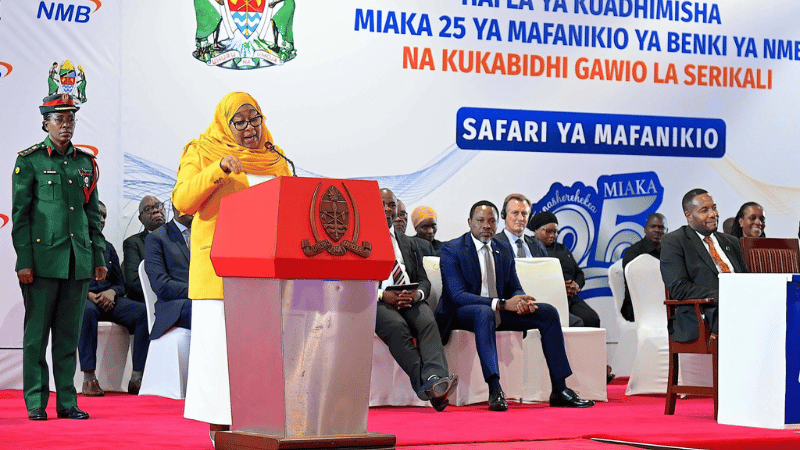Tanzania’s President Samia Suluhu Hassan has issued a warning to underperforming government parastatals, stating that they could face deregistration.
The announcement came during the conclusion of the NMB Bank PLC 25 years celebrations in Dar es Salaam on 17th June 2023.
In June this year, the bank approved a record dividends payout of TZS 143.1 billion for the financial year 2022, thanks to an impressive rise in its profitability.
The government of Tanzania owns 31.78% of NMB via the Treasury Registrar and received a check of more than TZS 45 billion.

President Hassan indicated that the government is currently assessing the performance of state-run corporations.
The first phase of the assessment, conducted by the Treasury Registrar, has been concluded, and the second round of assessment has been initiated on President Hassan’s directives.
“There is no turning back on this issue. There are those [corporations] that will be deregistered; some will be given a boost to be able to break even; and others will be given guidelines that will enable them to generate profits,” she stated.
President Hassan highlighted the importance of public institutions, noting that they have been established to generate income that would assist in running the government.
She expressed concern over parastatals that were consuming the government’s investment without returning profits.
“TR, tighten the screws! You have all my blessings. I’m waiting for the final report about entities that should be struck off the register, those that should remain, and those that have to be assisted to do business,” she said.
President Hassan’s remarks come at a time when Tanzania is trying to boost its economic growth and development. Parastatals or state corporations play a significant role in the Tanzanian economy, contributing to various sectors such as agriculture, manufacturing, banking, and others.
In recent years, however, some of these corporations have been underperforming, leading to losses and ineffective use of resources. This move by President Hassan signals a new era of accountability and performance-based evaluation for state-run corporations.
The Tanzanian government’s stringent approach towards parastatals marks a crucial step in ensuring the effective use of resources and the profitability of these state-run corporations. It remains to be seen how this will impact the overall performance of parastatals and the Tanzanian economy at large.










